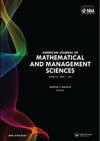Algorithms for Determination of Sample Sizes for Bayesian Estimations in Single-Server Markovian Queues
Q3 Business, Management and Accounting
American Journal of Mathematical and Management Sciences
Pub Date : 2023-10-02
DOI:10.1080/01966324.2023.2255316
引用次数: 1
Abstract
AbstractAlthough the single-server Markovian queues are one of the simplest models in Queue Theory, they have important practical applications. One of the initial steps for its application includes the determination of the necessary sample sizes for an interval estimation of its parameters. This includes the traffic intensity, which is defined as the ratio between the arrival rate and the service rate. In this article, we develop Bayesian algorithms to determine the size of samples that must be collected to guarantee a pre-specified mean amplitude or mean coverage for the traffic intensity. These samples are composed of the number of arrivals during service times, a practical way to collect data. Monte Carlo simulations attest to the efficiency and effectiveness of the algorithms proposed.Keywords: Bayesian inferencecredible regionMarkovian queuessample size AcknowledgmentsWe would like to thank the referees and the Editor-in-Chief for their detailed and insightful comments, which led to a much-improved manuscript.Authors’ ContributionsESG, FRBC, and SKS contributed equally to the design and implementation of the research, to the analysis of the results, and to the final writing of the manuscript.Disclosure StatementNo potential conflict of interest was reported by the author(s).Data Availability StatementThe data used to support the findings of this study are included in the article.Code Availability StatementThe proposed algorithms can be encoded in the reader’s favorite programming language. The R scripts can be obtained from the authors upon request.Additional informationFundingESG acknowledges CAPES (Coordenação de Aperfeiçoamento de Pessoal de Nìvel Superior, grant 88887.823719/2023-00 under Programa de Demanda Social at UFMG). FRBC acknowledges FAPEMIG (Fundação de Amparo à Pesquisa do Estado de Minas Gerais, grant CEX-PPM-00564-17) and CNPq (Conselho Nacional de Desenvolvimento Científico e Tecnológico, grant 305442/2022-8) for partial financial support. SKS acknowledges OSHEC (Odisha State Higher Education Council) for financial support under OURIIP Seed Fund, Govt. of Odisha, India with reference no. 22SF/ST/116 (Sanction Order Number 174/144/OSHEC).单服务器马尔可夫队列中贝叶斯估计样本大小的确定算法
单服务器马尔可夫队列虽然是队列理论中最简单的模型之一,但却有着重要的实际应用。其应用的初始步骤之一包括确定其参数区间估计所需的样本量。这包括交通强度,它被定义为到达率和服务率之间的比率。在本文中,我们开发了贝叶斯算法来确定必须收集的样本的大小,以保证预先指定的平均振幅或交通强度的平均覆盖。这些样本由服务时间内到达的数量组成,这是一种收集数据的实用方法。蒙特卡洛仿真验证了所提算法的效率和有效性。关键字:贝叶斯推断可信区域马尔可夫队列样本大小致谢我们要感谢审稿人和主编详细而深刻的意见,这使得我们的手稿得到了很大的改进。sesg、FRBC和SKS对研究的设计和实施、结果分析和最终稿件的撰写做出了同等的贡献。披露声明作者未报告潜在的利益冲突。数据可用性声明用于支持本研究结果的数据包含在文章中。代码可用性声明所提出的算法可以用读者最喜欢的编程语言进行编码。R脚本可以根据要求从作者那里获得。esg承认CAPES的资金来源(Nìvel Superior项目协调委员会,资助88887.823719/2023-00,umg社会需求项目)。FRBC感谢FAPEMIG (FAPEMIG) (Minas Gerais州政府基金,资助ceex - ppm -00564-17)和CNPq (Conselho Nacional de Desenvolvimento Científico e Tecnológico,资助305442/2022-8)的部分财政支持。SKS感谢OSHEC(奥里萨邦高等教育委员会)在印度奥里萨邦政府OURIIP种子基金下的财政支持。22SF/ST/116(制裁令号174/144/OSHEC)。
本文章由计算机程序翻译,如有差异,请以英文原文为准。
求助全文
约1分钟内获得全文
求助全文
来源期刊

American Journal of Mathematical and Management Sciences
Business, Management and Accounting-Business, Management and Accounting (all)
CiteScore
2.70
自引率
0.00%
发文量
5
 求助内容:
求助内容: 应助结果提醒方式:
应助结果提醒方式:


